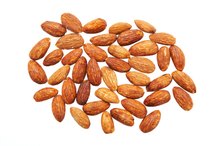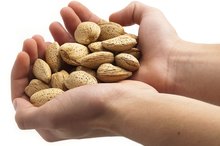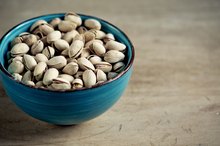What Vitamins & Minerals Do Nuts Contain?
Next time a snack craving hits, consider forgoing the crackers or chips and noshing on a handful of nuts instead. A growing body of evidence suggests that nuts, as part of a healthy diet, can have a tremendous health benefit, says the Academy of Nutrition and Dietetics. The U.S. Food and Drug Administration notes that almonds, hazelnuts, peanuts, pecans, pine nuts and walnuts -- all of which contain under 4 grams of saturated fat per 1.5-ounce serving -- may actually reduce the risk of heart disease. These nuts also contain particular vitamins and minerals that can increase overall health.
Antioxidant-Rich Almonds
Almonds (about 23 nuts per 1-ounce serving) are a great source of vitamin E, magnesium, calcium and folate, according to the Academy of Nutrition and Dietetics. Vitamin E is an antioxidant known to protect the body from tissue damage caused by free radicals, and it also plays a key role in keeping the immune system strong against viruses and bacteria. Magnesium is essential to the body's function, keeping blood pressure normal, bones strong and heart rhythm steady. Calcium helps form and maintain healthy bones, while folate is important for preventing anemia and birth defects.
Healthy Hazelnuts
The Nutrition of Smoked Almonds
Learn More
Sometimes called filberts, hazelnuts (about 21 nuts per 1-ounce serving) are rich in monounsaturated fats. Like almonds, they are a very good source of vitamin E; they also contain copper and manganese. Copper works with iron to help the body form red blood cells and also keeps blood vessels, nerves, bones and the immune system functioning properly. Manganese is thought to prevent and treat osteoarthritis, anemia and premenstrual syndrome.
Peanut Power
Peanuts (about 28 nuts per 1-ounce serving) are, like hazelnuts, an excellent source of manganese. They also are low in sodium and cholesterol and contain niacin, a type of B vitamin that helps the digestive system, skin and nerves to work well. Niacin also plays an important role in converting food to energy.
Disease-Fighting Pecans
Almonds: Nutrition & Inflammation
Learn More
Pecans (about 19 halves per 1-ounce serving) contain a healthy helping of monounsaturated fats. Most notably, they're rich in several antioxidants, substances that may protect cells against the effects of free radicals. Free radicals are molecules created when the body breaks down food, or by environmental exposures like tobacco smoke and radiation, and are thought to play a role in heart disease and cancer.
Pine Nuts and Phosphorous
Pine Nuts (about 167 nuts per 1-ounce serving) are a soft nut found inside the cones of various pine trees. Like almonds and hazelnuts, they're a good source of vitamin E. They also contain phosphorous, which plays a key role in the formation of bones and teeth, and in how the body uses carbohydrates and fats. Phosphorous also helps with kidney function, muscle contractions, normal heartbeat and nerve signaling.
Walnut Halves
Walnuts (about 14 halves per 1-ounce serving) are an integral part of the Mediterranean diet, a style of eating known for its health benefits. Like pecans, walnuts contain antioxidants. They're also an excellent source of alpha-linolenic acid (ALA), the plant-based form of omega-3, a fatty acid. ALA has been shown to reduce inflammation and may help prevent chronic diseases like heart disease and arthritis. It's thought to be important for brain and health development.
Related Articles
References
- National Institutes of Health: Vitamin E
- National Institutes of Health: Magnesium in Diet
- National Institutes of Health: Folic Acid
- National Institutes of Health: Copper in Diet
- National Institutes of Health: Niacin
- National Institutes of Health: Phosphorous in Diet
- National Institutes of Health: Antioxidants
Writer Bio
Jaime Budzienski has contributed essays and articles to the "Boston Globe Sunday Magazine," "Pregnancy and Newborn Magazine" and the "Boston Parents Paper." She holds a B.F.A. in writing, literature and publishing from Emerson College and a master's degree in education from UMASS Boston.









